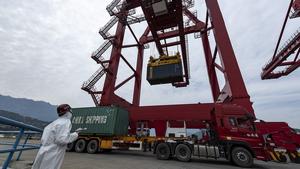 A crane hoists a cargo container at Zigui port, which is located at the upper reaches of the Three Gorges Dam, in Zigui county, in Hubei province, March 17, 2020. (PHOTO / XINHUA)
A crane hoists a cargo container at Zigui port, which is located at the upper reaches of the Three Gorges Dam, in Zigui county, in Hubei province, March 17, 2020. (PHOTO / XINHUA)
Growth of non-financial sector foreign direct investment on the Chinese mainland surged 11.8 percent year-on-year in April, compared with a decline of 14.1 percent in March, showing that global companies' confidence had continued to grow in the country despite the COVID-19 pandemic, according to data released by the Ministry of Commerce on Thursday.
The total FDI inflow into China fell 6.1 percent year-on-year to 286.55 billion yuan (US$40.34 billion) in the first four months of this year. The decline was 4.7 percentage points narrower than the level seen in the first quarter.
The total FDI inflow into China fell 6.1% year-on-year to 286.55 billion yuan (US$40.34 billion) in the first four months of this year. The decline was 4.7 percentage points narrower than the level seen in the first quarter
Gao Feng, a ministry spokesman, said the FDI growth drop is attributable to the COVID-19 outbreak in the first four months.
Thanks to the government's policies and measures to stabilize foreign investment and offer global companies easier market access, their confidence continued to increase in China, Gao said, adding that a number of key foreign investment projects were signed and implemented in the first four months.
ALSO READ: Ministry planning more steps to increase foreign investment and trade
To maintain solid economic fundamentals, the government emphasized the importance of focusing on the six priorities of safeguarding employment, people's livelihoods, the development of market entities, food and energy security, the stable operation of industrial and supply chains and the smooth functioning of society.
The spokesman said that since the global pandemic situation is still grim and the world's cross-border investment activities are at low levels, the situation of foreign investment inflows is still complicated, and stabilizing foreign trade this year remains a challenge.
Investment in China by economies related to the Belt and Road Initiative rose 7.9 percent and that of the Association of Southeast Asian Nations increased 13 percent year-on-year in the first four months, while investment by the European Union fell 29.1 percent on a year-on-year basis.
The global capital flow into high-tech services industries on the mainland grew by 2.7 percent year-on-year between January and April, with inflow of FDI into information services rising by 46.9 percent, e-commerce up by 73.8 percent and FDI in professional technological service sectors growing 99.6 percent year-on-year.
Jerome Jean Haegeli, chief economist of Swiss Re Group, said that in comparison with many other economies, China faces manageable supply chain risks as it is increasingly less reliant on manufacturing FDI.
Thanks to the government's policies and measures to stabilize foreign investment and offer global companies easier market access, their confidence continued to increase in China, a spokesman for the Ministry of Commerce said
The nation has a remarkable potential domestic market, and it has been speeding up investment in new infrastructure. These two elements would facilitate its transformation into a consumption-oriented and digital economy, he said.
As China flattens the COVID-19 curve and steadily returns to normality, he stressed that the Chinese economy is best placed to emerge as the world's strongest from the crisis, and it still has competitive advantages based on a range of indicators, such as its labor market and infrastructure. These will be further enhanced by targeted market reforms, he said.
READ MORE: China's industrial output posts first expansion after outbreak
Thomas Brenner, general manager of the Smart Infrastructure unit at Siemens China, said as China is accelerating the development of new infrastructure, the integration of these facilities with artificial intelligence, the internet of things and other advanced technologies will greatly drive the transformation and upgrading of the electricity grid, buildings, mobility and other sectors in its cities.
Peter Tyroller, member of the board of management of Robert Bosch GmbH responsible for the Asia-Pacific region, said that although the outbreak has had a significant impact on the global economy and companies, the German company remains convinced about the potential of the Chinese market.
As Bosch has invested 48.5 billion yuan in China's manufacturing and innovation sectors over the past decade, he said the company will make every effort to ensure sustained and stable supplies to meet increasing demand from the Chinese market as the company seeks to tap into development opportunities and spur its future growth in the world's second-largest economy.
Contact the writers at zhongnan@chinadaily.com.cn


